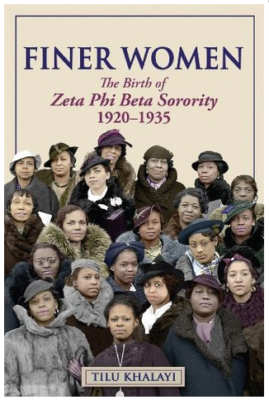Finer Women: Zeta Phi Beta Sorority 1920 – 1935

Author Tilu Khalayi has amassed the personal biographies not only of distinguished Honorary Members of Zeta Phi Beta Sorority, but also of the very interesting and accomplished young women who founded the Zetas from it’s charter at Howard University in 1920 through it’s amazing national and international charter of chapters to 1935. It’s extraordinary. Full stop. It just is.
The style of the book reminded me of an actual college yearbook – personal biographies of the women founders, histories of the individual chapters, the Honorary Members, and Selected Writings and Speeches. Khalayi walks us through the genesis of Zeta Phi Beta as a sister organization of the already established Phi Beta Sigma Fraternity at Howard University. There were already two well established sororities on campus, Alpha Kappa Alpha (AKA) and Delta Sigma Theta (Delta).
Zeta was “the first black sorority for which members were selected primarily on the basis of academic achievement.” [Audrey Kerr, Maryland University] Myrtle Tyler Faithful confirmed this, having stated that “we weren’t looking at how rich you were or what you looked like or how you dressed.” Instead the sorority considered young women for membership based on their unique abilities, and the famous writer Zora Neale Hurston is a great testament to that practice.
Students had to be academic standouts to get into the Zeta Phi Beta and they had to maintain that academic excellence to stay. The principles that they established as the ideological foundations of the sorority are scholarship, service, sisterly love and finer womanhood. They began with a “Finer Womanhood Week” that became “Finer Womanhood Month” and their annual Boulé meetings held each December featured speakers that focused on that theme of Finer Womanhood and how it is achieved.
I was captivated reading about where these young women came from, who their parents and grandparents were, where they went to school and how they came to be at Howard University, and what they did afterward. It is such a window to what the world was like for Black women striving to better their own lives and those of other women. And there are all kinds of gems tucked into those biographies.
One of the first pledges of the new Zeta Alpha Chapter, Pauline Johnson Phillips, age 17, was the first Black valedictorian of any high school in Connellsville, Pennslvania, graduating on June 16, 1917. What struck me about this biography was the fact that there were integrated schools in this country before de jure segregation of cities and neighborhoods forced them to be segregated. The local Connellsville Daily Courier reported: “She is the first colored graduate to take honors here and the entire occasion was made very impressive. She received an ovation as she rose to deliver her essay.” Having recently read Richard Rothstein’s The Color of Law I’m infuriated all over again by how this country has perpetuated institutionalized racism with impunity.
Annie Turnbo Malone. Holy Cow, how could I possibly NOT know who this woman was? The first profile under “Honorary Members.” She was the Oprah Winfrey of the turn of 20th century America. The first self-made Black woman millionaire, she built an empire on hair care products for Black women. What an extraordinary woman. She pioneered the business model on which Avon and Mary Kay were built – giving women the opportunity and incentives to sell products and make money. She gave record breaking endowments and donations to Howard University and many other HBCUs, along with numerous charities. She built Poro College in St. Louis that became the center of Black St. Louis. Who knew this?
Madam Evanti, the famous Black opera singer I’ve never heard of. (Her great uncle, Hiram Revels, was the first Black person to serve in the United States Senate.) Her race barred her from joining the Metropolitan Opera in this country, but she was celebrated and welcomed elsewhere in the world. She did perform at the White House for three presidents: Franklin Roosevelt, Harry Truman and Dwight Eisenhower and was given a commendation by President Eisenhower for her work with the USO.
Nettie Langston Napier. She was considered “The First Lady of Black Nashville.” Her father, John Mercer Langston, was the first Black Dean of Howard University Law School, and the first Black representative elected to Congress from Virginia in a contested election in 1888. Her husband J.C. Napier was a Register of the Treasury from 1911 -1913, and he would go down in history as one of only five Black people whose signatures have appeared on U.S. currency. Her nephew was the poet Langston Hughes.
See what I mean about a whole lot of history stuffed into a few well crafted paragraphs?
What interested me about this book in the first place is the extraordinary power of Black sororities. They are a powerhouse and their influence is fully a hundred years in the making. This was brought home to me by an article in The Atlantic in 2015 The Political Power of the Black Sorority. I see them in the gallery of Virginia’s House and Senate on Lobby Days (they are hard to miss!) and I am in awe of their ability to organize and apply pressure where it counts. This book shines a light on a history I did not know and I enjoyed every minute of discovering these women and what they accomplished.
I’ve never belonged to a sorority, but I know quite a few women who are active members of Black sororities and I admire them greatly. I highly recommend this book to those who love American history and are curious about the history they’ve never heard before.